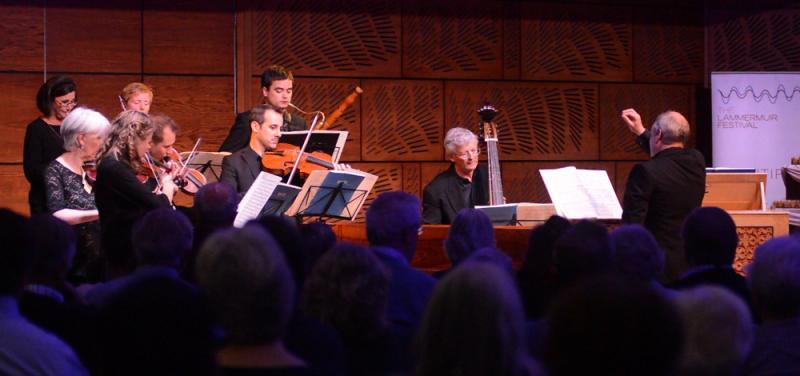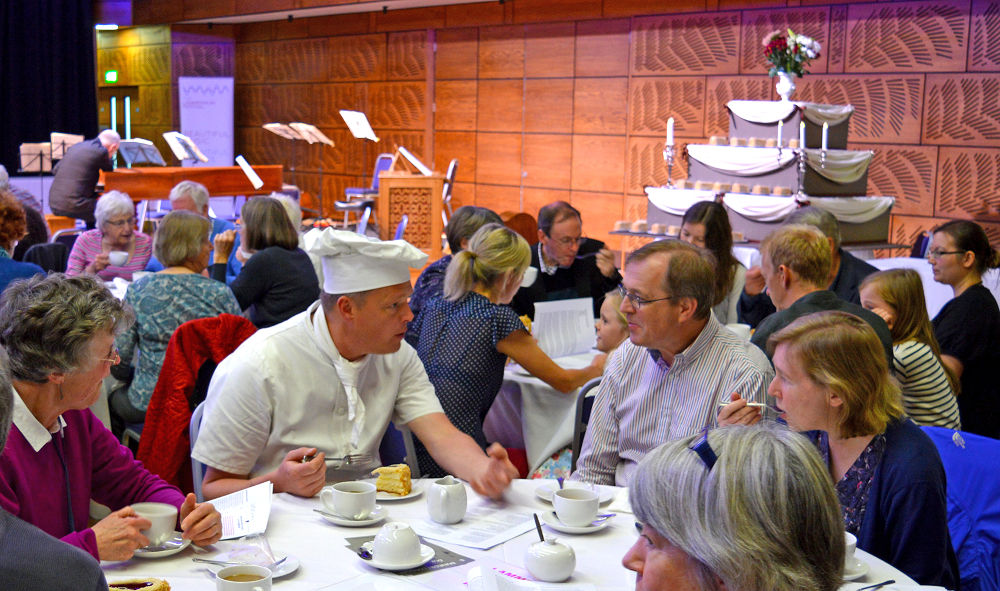Dunedin Consort, Butt, Brunton Theatre, Musselburgh | reviews, news & interviews
Dunedin Consort, Butt, Brunton Theatre, Musselburgh
Dunedin Consort, Butt, Brunton Theatre, Musselburgh
Cantatas, coffee and cake mingle to quietly revelatory effect

It was, admitted the Lammermuir Festival’s co-artistic director James Waters, ‘a bit of an experiment’. And trying to recreate the fertile atmosphere – intellectual, musical and culinary – of a Leipzig coffee house from the 1730s, complete with Bach, coffee and cake, could so easily have become just an excuse to expand the waistline in the name of art. Or worse, a tempting tasty marketing ploy to bring in reluctant new audience members.
This was the Sunday afternoon treat in the first weekend of the Lammermuir Festival, the annual bit-more-than-a-week of fine music making – now in its sixth year – that takes over churches and historic buildings in the villages of East Lothian, and follows hot on the heels of the August festival mayhem of Edinburgh, just up the A1.
Not that Musselburgh’s 1970s Brunton Theatre, with its glowing neon and stripped word, exactly counts as a historic building. There might have been more atmospheric venues for the Festival’s nod to the cultural life of 18th-century coffee houses, but then again, authenticity and historical appropriateness were both up for discussion across the whole event.
Musically, period-performance expert John Butt and his one-to-a-part Dunedin Consort gave impeccably stylish performances of two Bach cantatas plus his First Orchestral Suite. Butt was joined by Edinburgh University history lecturer Nicholas Phillipson for some ebullient discussion of the Enlightenment in Germany and Scotland, and the role of authenticity in performance and study. And German-born Konditormeister (or master baker) Falko Burkert (pictured below with his cake creation), now based in Scotland and with cafes in swanky Bruntsfield and Gullane, had concocted a special, historically appropriate almond cake for the occasion.
With its mixture of music, panel discussion and cake/coffee consumption, there was a danger that the event could lack focus. But each element was strong in its own right, and together they blended to create, maybe not a slavish recreation of Bach’s own coffee-house experiences, but at least a modern-day opportunity to meet, listen, eat, drink and take time to consider some weightier musical and cultural issues.
 In terms of music, Butt’s Dunedin Consort were perky and hugely characterful. They were joined by soprano Mary Bevan and bass-baritone Matthew Brook for a very entertaining account of Bach’s Coffee Cantata that turned it virtually into a miniature opera, with Bevan’s sulky, stoppy daughter, denied a husband because of her love of the drink, matched ably by Brook’s wily, scheming father. It felt a bit less than apt – that question of appropriateness again – to close the concert with a sacred cantata (let alone one sixth of the Christmas Oratorio) that would never have been heard amid the chatter of a coffee house, but it was a beautifully judged account nonetheless, rich, brisk and fluid.
In terms of music, Butt’s Dunedin Consort were perky and hugely characterful. They were joined by soprano Mary Bevan and bass-baritone Matthew Brook for a very entertaining account of Bach’s Coffee Cantata that turned it virtually into a miniature opera, with Bevan’s sulky, stoppy daughter, denied a husband because of her love of the drink, matched ably by Brook’s wily, scheming father. It felt a bit less than apt – that question of appropriateness again – to close the concert with a sacred cantata (let alone one sixth of the Christmas Oratorio) that would never have been heard amid the chatter of a coffee house, but it was a beautifully judged account nonetheless, rich, brisk and fluid.
It was probably better not to think too hard, however, about the mind-bending self-referentiality of Butt and Phillipson’s discussions about the discussions that might have taken place in similar situations in Leipzig’s coffee houses three centuries previously. Instead, just sit back and admire the two men’s easy erudition – which prompted many conversations across the afternoon tea tables that had replaced the Brunton’s usual seating.
It was an experiment for sure. But it was one that paid off in terms of its abundant audience – drawn by the event’s various elements, of course – but also in terms of the engaging, fresh light it shed on the cafe culture of Bach’s time, and in provoking thoughts and discussion about our own.
rating
Explore topics
Share this article
The future of Arts Journalism
You can stop theartsdesk.com closing!
We urgently need financing to survive. Our fundraising drive has thus far raised £49,000 but we need to reach £100,000 or we will be forced to close. Please contribute here: https://gofund.me/c3f6033d
And if you can forward this information to anyone who might assist, we’d be grateful.

Subscribe to theartsdesk.com
Thank you for continuing to read our work on theartsdesk.com. For unlimited access to every article in its entirety, including our archive of more than 15,000 pieces, we're asking for £5 per month or £40 per year. We feel it's a very good deal, and hope you do too.
To take a subscription now simply click here.
And if you're looking for that extra gift for a friend or family member, why not treat them to a theartsdesk.com gift subscription?
more Classical music
 Kohout, Spence, Braun, Manchester Camerata, Huth, RNCM, Manchester review - joy, insight, imagination and unanimity
Celebration of the past with stars of the future at the Royal Northern College
Kohout, Spence, Braun, Manchester Camerata, Huth, RNCM, Manchester review - joy, insight, imagination and unanimity
Celebration of the past with stars of the future at the Royal Northern College
 Jansen, LSO, Pappano, Barbican review - profound and bracing emotional workouts
Great soloist, conductor and orchestra take Britten and Shostakovich to the edge
Jansen, LSO, Pappano, Barbican review - profound and bracing emotional workouts
Great soloist, conductor and orchestra take Britten and Shostakovich to the edge
 Jakub Hrůša and Friends in Concert, Royal Opera review - fleshcreep in two uneven halves
Bartók kept short, and a sprawling Dvořák choral ballad done as well as it could be
Jakub Hrůša and Friends in Concert, Royal Opera review - fleshcreep in two uneven halves
Bartók kept short, and a sprawling Dvořák choral ballad done as well as it could be
 Hadelich, BBC Philharmonic, Storgårds, Bridgewater Hall, Manchester review - youth, fate and pain
Prokofiev in the hands of a fine violinist has surely never sounded better
Hadelich, BBC Philharmonic, Storgårds, Bridgewater Hall, Manchester review - youth, fate and pain
Prokofiev in the hands of a fine violinist has surely never sounded better
 Monteverdi Choir, ORR, Heras-Casado, St Martin-in-the-Fields review - flames of joy and sorrow
First-rate soloists, choir and orchestra unite in a blazing Mozart Requiem
Monteverdi Choir, ORR, Heras-Casado, St Martin-in-the-Fields review - flames of joy and sorrow
First-rate soloists, choir and orchestra unite in a blazing Mozart Requiem
 Cho, LSO, Pappano, Barbican review - finely-focused stormy weather
Chameleonic Seong-Jin Cho is a match for the fine-tuning of the LSO’s Chief Conductor
Cho, LSO, Pappano, Barbican review - finely-focused stormy weather
Chameleonic Seong-Jin Cho is a match for the fine-tuning of the LSO’s Chief Conductor
 Classical CDs: Shrouds, silhouettes and superstition
Cello concertos, choral collections and a stunning tribute to a contemporary giant
Classical CDs: Shrouds, silhouettes and superstition
Cello concertos, choral collections and a stunning tribute to a contemporary giant
 Appl, Levickis, Wigmore Hall review - fun to the fore in cabaret and show songs
A relaxed evening of light-hearted fare, with the accordion offering unusual colours
Appl, Levickis, Wigmore Hall review - fun to the fore in cabaret and show songs
A relaxed evening of light-hearted fare, with the accordion offering unusual colours
 Lammermuir Festival 2025, Part 2 review - from the soaringly sublime to the zoologically ridiculous
Bigger than ever, and the quality remains astonishingly high
Lammermuir Festival 2025, Part 2 review - from the soaringly sublime to the zoologically ridiculous
Bigger than ever, and the quality remains astonishingly high
 BBC Proms: Ehnes, Sinfonia of London, Wilson review - aspects of love
Sensuous Ravel, and bittersweet Bernstein, on an amorous evening
BBC Proms: Ehnes, Sinfonia of London, Wilson review - aspects of love
Sensuous Ravel, and bittersweet Bernstein, on an amorous evening
 Presteigne Festival 2025 review - new music is centre stage in the Welsh Marches
Music by 30 living composers, with Eleanor Alberga topping the bill
Presteigne Festival 2025 review - new music is centre stage in the Welsh Marches
Music by 30 living composers, with Eleanor Alberga topping the bill
 Lammermuir Festival 2025 review - music with soul from the heart of East Lothian
Baroque splendour, and chamber-ensemble drama, amid history-haunted lands
Lammermuir Festival 2025 review - music with soul from the heart of East Lothian
Baroque splendour, and chamber-ensemble drama, amid history-haunted lands

Add comment